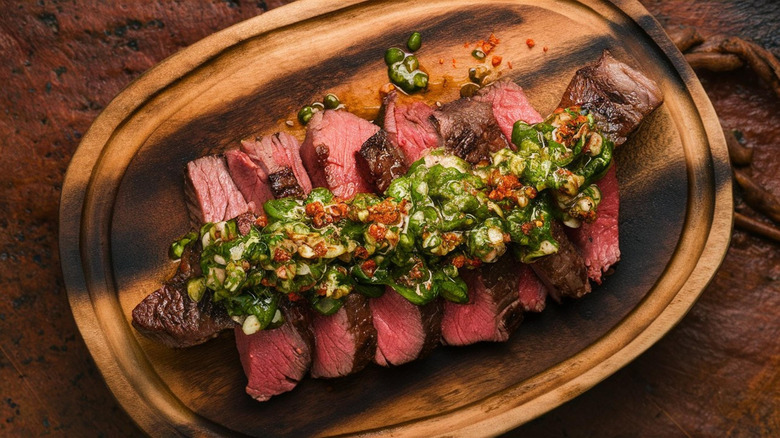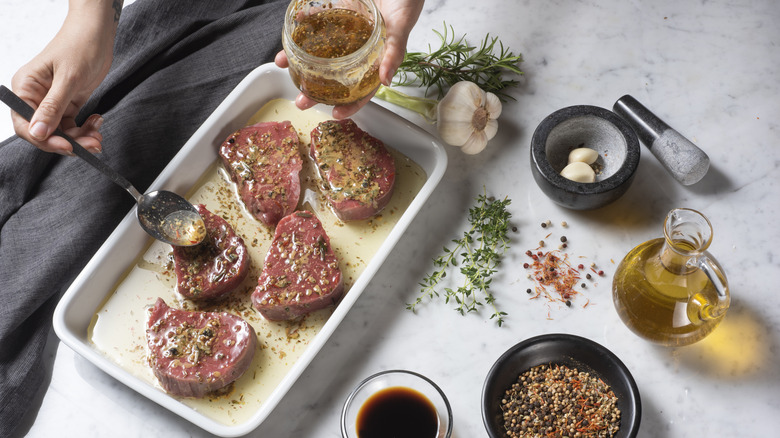For A Perfect Steak Marinade, Look To These Ingredients
The secret to a succulent, juicy piece of steak is often a well-crafted marinade — a step some skip, but one worth considering. Even an ingredient as simple and mundane as salt can bring out subtle flavors of the meat and season it nicely, similar to the effect a good, salty brine has on small meat cuts. It tenderizes the steak to ensure every bite is melt-in-your-mouth perfect, while also enhancing the exterior and promoting a rich, golden-brown sear.
Though it often depends on the type of cut and personal preference, some key ingredients can help up your steak game, turning it from ordinary to stupendous. Daily Meal asked Fares Kargar, owner and executive chef of Debar Restaurant and Bar, to recommend a few that cut it.
According to Kargar, a well-rounded steak marinade stands on four pillars — oil, acid, flavoring, and salt — with varying ratios, of course. Numbers play a crucial role in the game of steaks as too much of anything can destroy your almost-perfect steak in minutes, like a house of cards. For instance, an excess of acid can leave the meat overly mushy or pickled, and too much salt can overpower the dish. "I stick to a 3-to-1 ratio – three parts oil to one part acid," Kargar said when asked about the ideal proportions. It is also always a good idea to start your marinade with oil, as it is a flavor carrier and helps coat the meat, ensuring an even distribution.
Select these ingredients for the perfect steak marinade
For the choice of oil, Fares Kargar suggests opting for a neutral oil, like grapeseed or olive oil. Neutral oils are versatile and blend well with different kinds of spices and ingredients due to their subtle flavor. Avocado oil and canola oil are also some good options among neutral oils.
"For steak, I like acids like red wine or balsamic vinegar," says Kargar. Acids break down the tissues in meat to make it more tender. As for the choice of wine, medium-bodied to robust dry red wines, like Merlot, are known to pair well with steak. Balsamic vinegar is also a great option if you want to skip adding sugar, as along with breaking down muscles, it adds a complex, sweet undertone to the steak, and lends a quality of wholesomeness to it.
Sharing her picks on the last of the four pillars, Kargar swears by rosemary, garlic, and black pepper, a choice as simple and classic as a meal of steak. Rosemary's pine-like scent and earthy taste blend well with steak and, well, you cannot ever go wrong with garlic and black pepper.
Time it according to the cut of steak
When it comes to the number of hours required for the marinade to emulsify, a lot of us are left confused. Understanding the correlation between the cut of steak and marination time can save you from the dilemma. A boneless steak like top sirloin, filet mignon, or flank steak requires less time. "Thicker cuts benefit from more time, especially for grilling," Fares Kargar told Daily Meal, recommending one to 12 hours for a boneless steak. When asked about bone-in steaks like T-bone or porterhouse, she said, "You can go longer, up to 24 hours." This is because the bone in a steak can act as a barrier, preventing the marinade from fully penetrating the meat fibers.
A rookie mistake that many make even after coming up with a flawless marinade recipe is to not completely immerse the meat in it and seal it in an airtight container or resealable bag. This is an important step to ensure consistency in flavor. While you can always add a dash of creativity and come up with a signature marinade of your own, these ingredients can be your starting point to whip up the perfect marinade for your steak.


